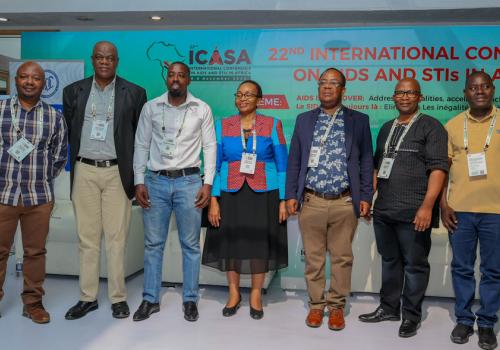The Southern African Development Community (SADC) region has experienced a decline of 57% of new HIV infections, while more than 80% of SADC citizens who are living with HIV have access to life saving treatment.
This was highlighted during a side event organised by the SADC Secretariat on 7th December 2023 on the margins of the 22nd International Conference on AIDS and Sexually Transmitted Infections in Africa (ICASA), in Harare, Zimbabwe.
Ms Duduzile Simelane the Director of Social and Human Development at the SADC Secretariat said the side event provided the SADC Secretariat and the SADC Region an avenue to showcase their work in the fight against HIV and AIDS, exchange best practices, and benefit from experiences within the region and beyond.
The ICASA is the premier gathering for all working in the field of health as well as leaders, people living with HIV, and others committed to ending the AIDS epidemic from around the world to share the latest scientific advances, learn from one another’s expertise, and develop strategies for advancing all facets of collective efforts to end AIDS by 2030.
Ms Simelane said that while a lot still needs to be done in the region’s efforts to fight HIV and AIDS, AIDS-related deaths have reduced by more than 60%; and four out of the 16 SADC Member States, Botswana, Kingdom of Eswatini, Zimbabwe and the United Republic of Tanzania, have reached the UNAIDS 95-95-95 targets well ahead of time, meaning that, in these Member States, 95% of all people living with HIV know their HIV status, 95% of people who know their status are on treatment, and 95% of people on HIV treatment have a suppressed viral load and several other Member States are close to achieving this key milestone.
The SADC Secretariat has been managing and administering the regional HIV and AIDS Fund which was established by the SADC Heads of States and Government under the guidance of the Maseru Declaration to reaffirm the region’s commitment to the fight against HIV and AIDS. The Fund is used on projects and interventions intended to enhance the capacity, output, or impact of existing HIV and AIDS programmes in Member states.
SADC has supported several programmes implementing regional HIV and AIDS interventions, and during the SADC side event, four recipient organisations of the SADC HIV and AIDS regional fund showcased their interventions, while three SADC countries shared their experiences towards the 95-95-95 target.
Dr Tatenda Songore, Executive Director for Youth Advocate Zimbabwe, highlighted how the project they implemented enhanced access to integrated HIV services amongst adolescents and young people through m-Health in Southern Africa.
Mr Patrick Nyamaruze a Post-doctoral Research Fellow at the University of KwaZulu-Natal highlighted the project currently being implemented focusing on the influence of intersectional stigma on the uptake and retention in Antiretroviral therapy (ART) programmes for selected key population groups in three SADC countries, Malawi, Zambia, and Zimbabwe.
Mr Kenneth Kamwi, Project Manager of Walvis Bay Corridor Group based in Namibia, showcased a project they implemented which strengthened and scaled up comprehensive HIV and AIDS service delivery packages at four Cross Border sites in Namibia, Zambia, and Angola.
Mr Joseph Mbasha, Programme Manager for Partnership and network organisation in the United Republic of Tanzania showcased the project implemented which supported timely screening and diagnosis of HIV and AIDS, early Antiretroviral therapy (ART) initiation and good ART adherence for the population experiencing Non-Communicable Diseases (NCDs) and intersectional vulnerability.
Mr Ontiretse Letlhare, the National Coordinator for the National AIDS and Health Promotion Agency (NAHPA) of Botswana; Mr Dumisani Kunene, the Acting Executive Director National Emergency Response Council on HIV and AIDS (NERCHA) in the Kingdom of Eswatini, and Dr Bernard Madzima, the Chief Executive Officer for the National AIDS Council of Zimbabwe shared their countries experiences towards the 95-95-95 target.

